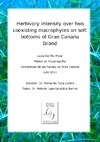Identificador persistente para citar o vincular este elemento:
https://accedacris.ulpgc.es/jspui/handle/10553/12342
| Título: | Herbivory intensity over two coexisting macrophytes on soft bottoms of Gran Canaria Island | Autores/as: | Río Moral, Lucía Del | Director/a : | González Ramos, Antonio Juan Tuya Cortés, Fernando José |
Clasificación UNESCO: | 241705 Biología marina | Palabras clave: | Praderas marinas - Canarias Ecosistemas marinos - Canarias |
Fecha de publicación: | 2014 | Resumen: | Seagrass meadows are highly productive and complex ecosystems delivering key ecosystem good and services. Typically, seagrasses are found on shallow-water soft bottoms interspersed with other macrophytes, e.g. green macroalgae. Herbivory over seagrasses has a larger influence than previously though and can contribute significantly to seagrass dynamics In this study, we aimed to assess whether the magnitude of herbivory differed between two coexisting macrophytes, the seagrass Cymodocea nodosa and the green seaweed Caulerpa prolifera on Gran Canaria Island. We focused on the impact of macrograzers over these two macrophytes during two seasons, and we combined outdoor experimentation (through direct and indirect approaches that estimated differences in the intensity of herbivory between both macrophytes) and indoor experimentation. Our results showed a significantly larger consumption of C. prolifera than C. nodosa. This fact notoriously contrasts with the classic idea that the genus Caulerpa contains chemical compounds, as caulerpenyne that deter herbivores. Fish abundance predicted the intensity of herbivory over C. nodosa leaves and C. prolifera fronds. Moreover, our results revealed that a physical feature of macrophytes (e.g. toughness) is a major driver of macro-herbivore feeding choices. | Departamento: | Biología | Facultad: | Facultad de Ciencias del Mar | Titulación: | Máster Universitario en Oceanografía | URI: | https://accedacris.ulpgc.es/handle/10553/12342 | Derechos: | by-nc-nd |
| Colección: | Trabajo final de máster |
En el caso de que no encuentre el documento puede ser debido a que el centro o las/os autoras/es no autorizan su publicación. Si tiene verdadero interés en el contenido del mismo, puede dirigirse al director/a o directores/as del trabajo cuyos datos encontrará más arriba.
Vista completaVisitas
50
actualizado el 10-ene-2026
Descargas
22
actualizado el 10-ene-2026
Google ScholarTM
Verifica
Comparte
Exporta metadatos
Los elementos en ULPGC accedaCRIS están protegidos por derechos de autor con todos los derechos reservados, a menos que se indique lo contrario.
